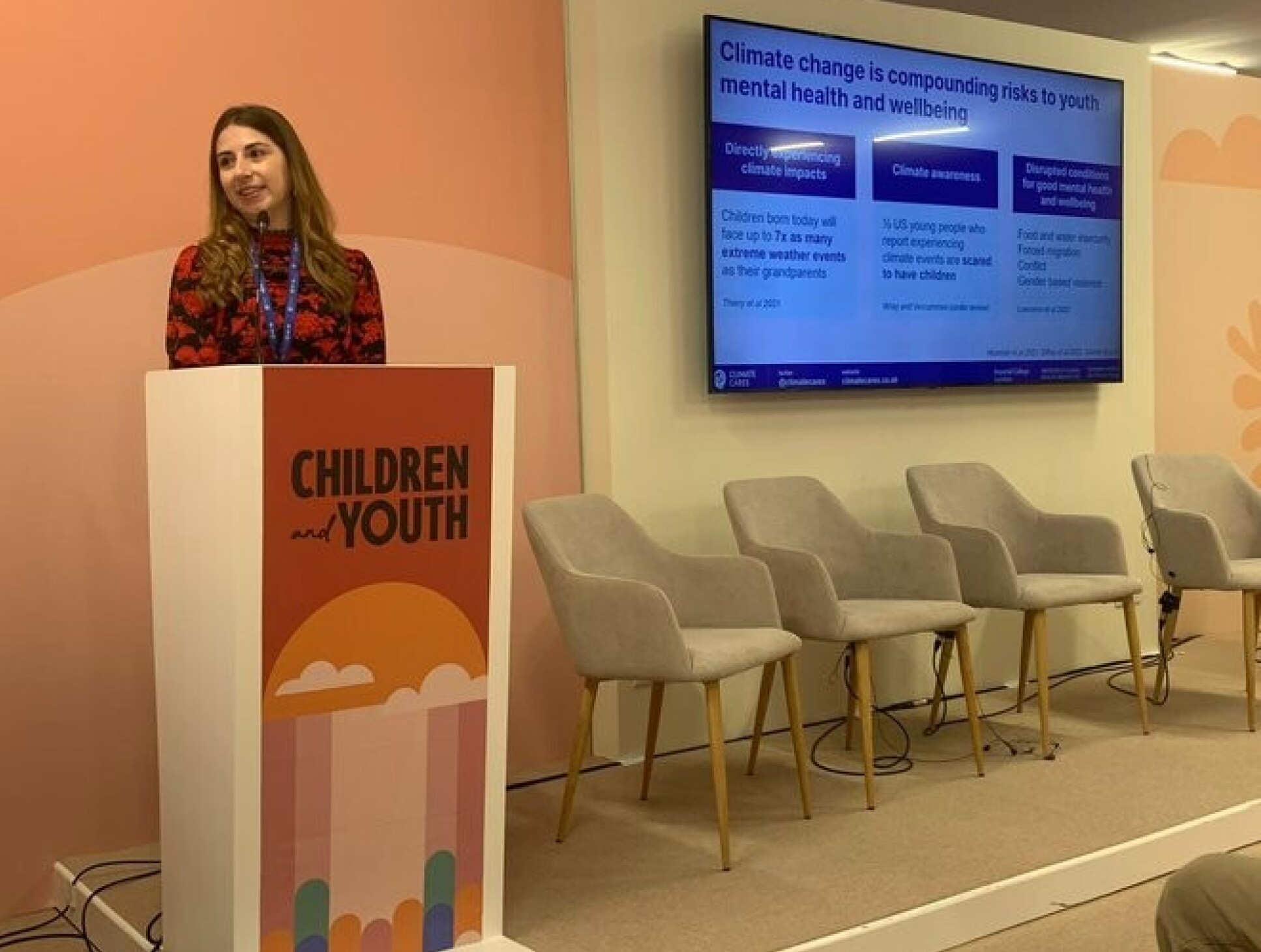Why mental health is front of mind at this year’s COP

Dr Omnia el Omrani addressing the audience at the Health Day Opening Sessions
COP28 includes a Health Day on 3 December, where Imperial researchers are calling to keep mental health at the heart of climate action.
Representatives from the Climate Cares Centre, one of the Institute of Global Health Innovation (IGHI) Centres of Excellence at Imperial College London, call for mental health to be part of climate negotiations.
This year’s UN Climate Change Conference of Parties (COP28), hosted by the United Arab Emirates to discuss progress on Climate Action, includes the first ever health day at COP.

Dr Emma Lawrance, Climate Cares Centre and Mental Health Lead at IGHI, said: “I am thrilled that COP28 will include the first ever themed day dedicated to health. But this is only the start of the discussion. The escalating, often hidden costs on mental health of continuing to prioritise fossil fuels must be accounted for. Investing in the mental health and wellbeing of communities can enable them to better cope with and act on the climate crisis, while climate action itself can create a better future for our collective health and wellbeing.”
At a Health Day session in the Youth Climate Champion Pavilion at COP, “Mental health and climate change: how climate change is affecting our mental health and what we can do”, Dr Emma Lawrance and Jessica Newberry Le Vay presented on how the impacts of climate change are taking a serious toll on mental health, by directly exposing people to higher temperatures and extreme weather and climate events, compounding exposure to traumas, and destabilizing social, economic, and environmental determinants of mental health.
Speaking on Health Day, Jessica Newberry Le Vay, Policy Fellow for Climate Change and Health at IGHI, presented insights from Connecting Climate Minds project, a global project led by teams from Imperial and working with partners in the seven Sustainable Development Goal regions. The session highlighted the climate-induced mental health impacts among the most vulnerable communities including youth, those with disabilities, indigenous peoples, and people living with severe mental health challenges. Newberry Le Vay talked about interventions that respond to climate-related mental health impacts.

Ms Newberry Le Vay said: “We call for mental health as a priority action for the health response to climate change. We see growing evidence for how the changing climate is impacting mental health and psychological resilience, and have heard from young people how this is disrupting key developmental events, like their education.”
Climate change and mental health are two of the greatest global challenges we face. People around the world are experiencing the mental health impacts of climate change. Stories from people with lived experience of the mental health impacts of climate change collected through the project include farmers dying by suicide as crops fail; young people feeling despair as they see their futures become hopeless and leaders failing to act. Furthermore, people experiencing climate disasters are often unable to heal before the next onslaught, compounding risks of post-traumatic stress disorder (PTSD) and anxiety.
Ms Newberry Le Vay added: “Through Connecting Climate Minds, we have identified evidence-based priorities for research that can inform action to meet the needs of people experiencing and responding to the mental health impacts of climate change. We are calling for coordinated action across governments, academia, civil society, and youth-led organizations to take these priorities forward.”
Dr Lawrance said: “The climate emergency is destabilising the conditions that support good physical and mental health. We need to keep health at the heart of climate action. Reducing emissions can lead to important co-benefits for good health such as cleaner air, healthier cities and stronger communities, while building resilience to the impacts of climate change must also take into account impacts on health.”
Earlier this year, Dr Lawrance and Professor Mala Rao, Director of the Ethnicity and Health Unit in the School of Public Health, called for health leaders to be involved in decision making at COP. They set out that the true metric of policies emerging from COPs should be the safeguarding of the health and wellbeing of people across the world, in a commentary piece published in the BMJ.
Dr Omnia el Omrani, Policy Fellow at Climate Cares, said: “We are proud to see mental health integrated into the Climate and Health Ministerial Declaration, and the establishment of the Climate and Health Secretariat, which has developed a narrative framework that discusses the impacts of climate change on physical, mental and social wellbeing.”
If you’re a funder or philanthropist interested in supporting this work at the intersection of climate change and mental health, please visit our Climate Cares website or contact us directly by email: climatecares@imperial.ac.uk
To get a sense of the events on the ground at COP’s Health Day, see the social takeovers:
Article text (excluding photos or graphics) © Imperial College London.
Photos and graphics subject to third party copyright used with permission or © Imperial College London.
Reporter
Victoria Murphy
Institute of Global Health Innovation